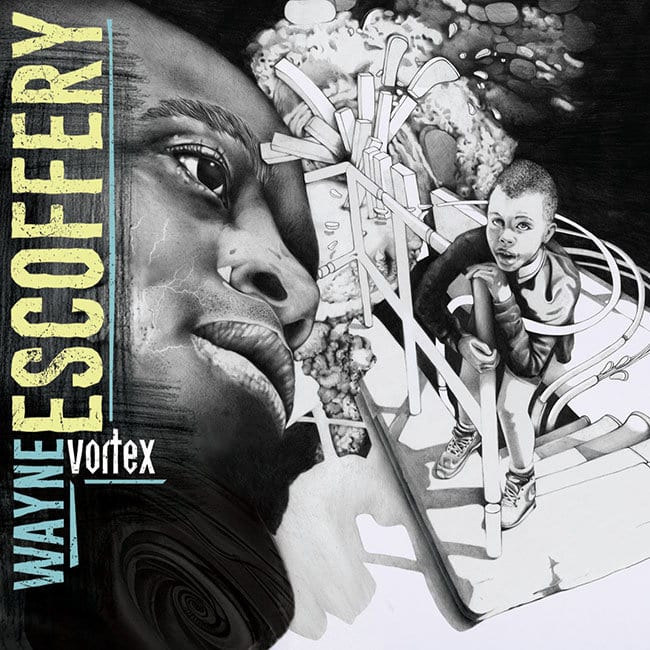
Amidst all the complex New Jazz that privileges composition and formal construction over classic jazz improvising, it’s great to get a dose of the old-fashioned, burning post-bop that made you love the music—but made today, of today, for today.
Wayne Escoffery plays the tenor saxophone, period. He rips and rises, purrs and coos, but he
plays it like mad. On Vortex, he is supported by a no-nonsense rhythm section that is a rollercoaster beneath and with him. And if you’re going to have a band that is modeled on the Cyclone, then the drummer you want is Mr. Ralph Peterson, Jr. Peterson is now an elder statesman on his instrument, but he still wows with wonder. Hearing him play as he does on Vortex is a joy.
Escoffery has that big bright sound that we associate with the modern tenor tradition of Chris Potter and Michael Brecker, combining the flowing sheets of sound that Coltrane invented with the best tonal elements of Sonny Rollins, from glimmer to woody warmth. If you listen to his impressive, gorgeously crafted improvisation on Peterson’s “Acceptance”, you will hear it all. That tune’s prelude, “Judgement”, allows Escoffery to play a long, Trane-esque cadenza over the rhythm section’s rolling set up, then the syncopated theme of “Acceptance” combines a Latin-influenced bass line with a lyrical melody. Pianist Dave Kikoski takes the first solo — tasty and to the point — before Escoffery takes off, developing his ideas from the theme, weaving in references to the prelude at points, then straining into his upper register, pulling back down for fast runs upward, getting goaded into a spinning arpeggio by Kikoski’s piano jabs… all with great control. Man, it’s a thrill to just go for a ride with a great player.
The cookers are the ones that stand out to me. “Vortex” is a burner from the start, requiring fast, coordinated unison runs from Kikoski and the leader, then perfect timekeeping from bassist Ugonna Okegwo. “To the Ends of the Earth” is a fast 6/8 tune with a sunny disposition on which Peterson’s hands seem ever in double-time mode. And “Baku” is a great stop-start theme that puts you in the mind of the late, great tenor titan Joe Henderson — a tricky theme that lurches and lunges while swinging the whole time. Kikoski’s solo is effortless and full of swirling soul.
Maybe it’s too easy to pass over the ballads, what with Ralph Peterson on hand to make uptempo sound so effortless. But Peterson has a salutary effect on all tempos. “February” is a sumptuous and swaying Latin ballad written by trumpeter Tom Harrell, and Peterson locks in with percussionist Jacquelene Acevedo to create a cool momentum. Kikoski is an untiring pianist on the fast tunes, right on the beat and swinging, but his touch here is sensuous and hip. Every chord voicing is the right one.
Mid-tempos are also mined deeply on
Vortex. “Tears for Carolyn” is a minor-mood theme set against an eighth-note groove that is right town the middle. Escoffery’s tone here is the thing: ripe and round, saying as much with just sound as with his notes, though they swirl and twist and then will suddenly pull up for a cry or drop down for a long, low one. He is fluent in the language, of course, but this solo eventually tells you a story. It’s his tune, and I hear him missing someone. “In His Eyes” brings trumpeter Jeremy Pelt onto the front line to create a soulful blend on another original by the leader. Each soloist keeps it brief, but this is the kind of soulful bop-funk that you loved when Donald Byrd and Lee Morgan were doing it in the 1960s. It’s still alive and kicking. It turns out this band can, indeed, make it sound like home cookin’ even in an era of podcasts and Blue Apron and cyber-trolling. Man, leave that stuff behind and listen to this music.
This kind of jazz date — a quartet, a few guests, uptempo swing plus Latin/ballads/midtempo bop — is a smidge passe in 2018. But then you listen, and you allow yourself to remember why this music has moved you over the years. And you listen to the actual playing, the passion of expression, the improbable truth that musicians this good are communicating in a language that is just as sophisticated as it is spontaneous. Is jazz dead? Or just this kind of jazz, already perfected 50 years, needn’t be made anymore?
Nope, I want more.

